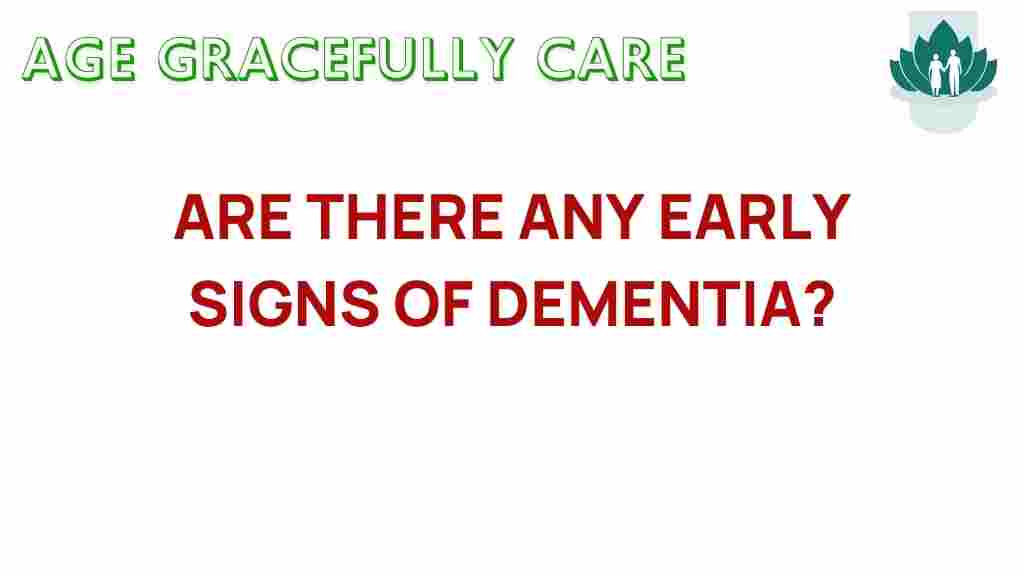Unveiling the Early Signs of Dementia: What You Need to Know
Dementia is a complex condition that affects millions of individuals and their families worldwide. Understanding the early signs of dementia is crucial for timely intervention and management. In this article, we will explore the early signs of cognitive decline, memory loss, and the warning signs that may indicate the onset of dementia. Additionally, we will provide caregiver tips to promote brain health and mental wellness.
Understanding Dementia and Cognitive Decline
Dementia is an umbrella term used to describe a range of symptoms associated with a decline in cognitive function severe enough to interfere with daily life. It encompasses various conditions, including Alzheimer’s disease, which is the most common form of dementia. Recognizing the early signs of dementia can help individuals seek help sooner and improve their quality of life.
Common Types of Dementia
- Alzheimer’s Disease: The most prevalent form of dementia, characterized by memory loss and cognitive decline.
- Vascular Dementia: Often caused by strokes, leading to problems with reasoning and judgment.
- Lewy Body Dementia: Associated with abnormal protein deposits in the brain, resulting in cognitive fluctuations and visual hallucinations.
- Frontotemporal Dementia: Affects the frontal and temporal lobes, leading to changes in personality and behavior.
Early Signs of Dementia: Key Indicators
Identifying the early signs of dementia can be challenging, as they may be subtle and attributed to normal aging. However, being aware of these warning signs can help you take proactive steps. Here are some early signs to watch for:
- Memory Loss: Frequent forgetfulness, especially of recent events or conversations, is a common early indicator of cognitive decline.
- Difficulty Finding Words: Struggling to find the right words during conversations or frequently pausing to think.
- Confusion with Time or Place: Losing track of dates, seasons, or the passage of time.
- Challenges in Planning or Solving Problems: Difficulty following recipes, managing budgets, or keeping track of monthly bills.
- Decreased or Poor Judgment: Making uncharacteristic decisions or exhibiting poor judgment in financial matters.
- Withdrawal from Social Activities: A noticeable decrease in interest in social engagements or previously enjoyed activities.
- Changes in Mood or Personality: Experiencing mood swings, confusion, or becoming easily upset.
The Importance of Early Detection
Early detection of dementia is essential for several reasons:
- Access to Treatments: There are medications and therapies available that can help manage symptoms and slow cognitive decline.
- Planning for the Future: Early diagnosis allows for better planning in terms of care needs and financial considerations.
- Support for Caregivers: Families can seek support and resources to manage the demands of caregiving.
When to Seek Help
If you or a loved one is experiencing the early signs of dementia, it is important to seek medical advice. A healthcare professional can conduct assessments and provide a diagnosis. Early intervention can lead to better outcomes and improved quality of life.
Tips for Caregivers: Supporting Brain Health and Mental Wellness
Caring for someone with dementia can be both rewarding and challenging. Here are some caregiver tips to help maintain brain health and promote mental wellness:
- Encourage Social Interaction: Engage your loved one in social activities to combat isolation and stimulate cognitive function.
- Maintain a Routine: Establishing a daily routine can provide structure and reduce confusion.
- Promote Physical Activity: Regular exercise can improve overall health and cognitive function.
- Provide Mental Stimulation: Puzzles, games, and reading can help keep the mind active.
- Ensure a Healthy Diet: A balanced diet rich in fruits, vegetables, whole grains, and lean proteins supports brain health.
- Stay Patient and Positive: Approach challenges with patience and maintain a positive attitude to encourage your loved one.
Strategies for Dementia Care
Here are some additional strategies to consider when caring for someone experiencing cognitive decline:
- Communication Techniques: Use simple language and short sentences. Allow extra time for responses.
- Safety Modifications: Assess the living environment for potential hazards and make necessary modifications to ensure safety.
- Involve Professional Help: Don’t hesitate to seek assistance from healthcare professionals, including geriatricians and neurologists.
- Use Memory Aids: Employ calendars, alarms, and notes to help your loved one with memory retention.
Resources for Caregivers
Several organizations offer valuable resources for caregivers of individuals with dementia. Here are a few to consider:
- Alzheimer’s Association – Provides support and information for those dealing with Alzheimer’s and related dementias.
- National Institute on Aging – Offers research-based information on aging and health, including dementia.
Conclusion: Prioritize Brain Health and Early Detection
Understanding the early signs of dementia is vital for individuals and their families. By recognizing these warning signs, seeking timely medical advice, and implementing caregiver tips, you can support brain health and mental wellness. Remember, early detection can lead to better management of symptoms and a higher quality of life. Stay informed and proactive in caring for yourself or your loved ones, and don’t hesitate to reach out for support when needed.
This article is in the category Health and created by AgeGracefullyCare Team
